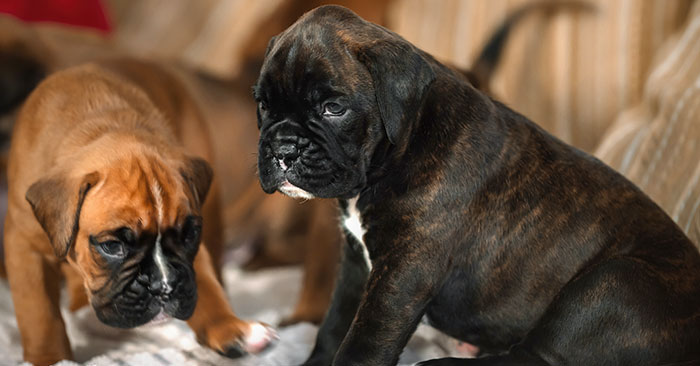Boxer puppies are an absolute delight. With their boundless energy, expressive faces, and loyal nature, they’re a favorite for many dog enthusiasts. But, like all pups, Boxers need guidance and training to become well-behaved, happy adult dogs.
If you’ve just brought one of these spirited puppies into your life, here are some essential training tips to get you started.
1. Start Early
The earlier you start training your Boxer puppy, the better. Young pups are like sponges, eager to learn and absorb new information. Beginning at around 8 weeks of age, you can introduce basic commands like “sit”, “stay”, and “come”.
This early training establishes a foundation for more advanced skills later on.
2. Consistency is Key
Boxer puppies thrive on consistency. Use the same commands, rewards, and corrections every time to avoid confusion. If multiple family members are involved in the training process, ensure everyone is on the same page.
3. Positive Reinforcement
Always reward good behavior. Whether it’s with treats, praise, or play, positive reinforcement encourages your pup to repeat desired actions. Boxers, being eager to please, respond well to this method.
4. Socialization
Socializing your Boxer puppy is crucial for a well-adjusted adult dog. Expose your pup to different environments, people, animals, and sounds. This helps reduce the chance of fearful or aggressive behavior in the future.
Puppy training classes can be a great place to start, as they offer controlled environments for socialization.
5. Addressing the Energy
Boxers are high-energy dogs. Make sure they have plenty of exercise and mental stimulation to prevent destructive behavior. Regular walks, playtime, and puzzle toys can help keep their energy in check.
6. Crate Training
Crate training can be beneficial for Boxer puppies. It provides a safe space for your pup and can aid in housebreaking. Introduce the crate in a positive manner, making it a cozy and inviting space. Never use it as a form of punishment.
7. Bite Inhibition
Boxer puppies, like many breeds, can be nippy. It’s crucial to teach them bite inhibition from a young age. When your pup bites too hard during play, let out a yelp and cease playing momentarily. This will teach them to be gentle.
8. Regular Vet Check-ups
Regular vet visits ensure your Boxer puppy is in good health. This indirectly helps with training, as a healthy pup is more likely to be attentive and responsive.
9. Join a Training Class
If you feel overwhelmed or unsure, consider joining a puppy training class. These classes offer expert guidance and a structured environment for learning.
10. Be Patient and Persistent
Training takes time. Remember that every dog is unique, and some might take longer to train than others. Celebrate small victories and remain patient during challenges.
The Boxer Puppies Barking Guide is a must-read article
Final Thoughts
Training your Boxer puppy is a journey, one filled with joy, challenges, and memorable moments. With consistency, patience, and the right techniques, your spirited Boxer pup will grow into a loyal, well-behaved companion.
So, grab those treats, a leash, and start the adventure of training!
FAQs on Boxer Puppies Training
Q: At what age should I start training my Boxer puppy?
A: You can begin basic training as early as 8 weeks old. This is the ideal time to start introducing foundational commands and behaviors.
Q: My Boxer puppy seems to have a lot of energy. How can I ensure this doesn’t interfere with training?
A: Boxers are known for their high energy. Incorporate physical activity like playtime and walks before training sessions to help them focus better. Additionally, mental stimulation toys can keep their active minds occupied.
Q: How often should I train my Boxer puppy daily?
A: Short, frequent training sessions are more effective for puppies. Aim for 10-15 minute sessions 2-3 times a day.
Q: Is it okay to use treats during training?
A: Yes, treats are a great way to use positive reinforcement. Just ensure the treats are suitable for puppies and consider reducing their meal portions slightly if you’re giving many treats during training.
Q: My Boxer puppy is biting a lot. How do I curb this behavior?
A: It’s natural for puppies to nip and bite during play. Introduce bite inhibition techniques, such as yelping or stopping play when they bite too hard. Over time, they’ll learn to control their bite strength.
Q: Are Boxers hard to train compared to other breeds?
A: Boxers are intelligent and eager to please, but they can also be stubborn. With consistency, patience, and positive reinforcement, they can be trained effectively.
Q: How important is socialization for Boxer puppies?
A: Socialization is crucial for Boxers. Exposing them to various environments, people, and other animals from a young age helps in reducing fearful or aggressive behaviors in adulthood.
Q: Do Boxers respond well to crate training?
A: Yes, crate training can be very effective for Boxer puppies. It can provide a safe space and assist in housebreaking. Just ensure it’s introduced positively and never used as punishment.
Q: How can I stop my Boxer puppy from jumping on people?
A: Teach them a solid “sit” command. Every time they attempt to jump, ask for a “sit” instead. Reward them for staying seated, especially when greeting new people.
Q: What should I do if my Boxer puppy doesn’t respond to training?
A: Be patient. Every puppy learns at their own pace. If you’re facing consistent challenges, consider consulting with a professional dog trainer or joining a puppy training class for additional guidance.



